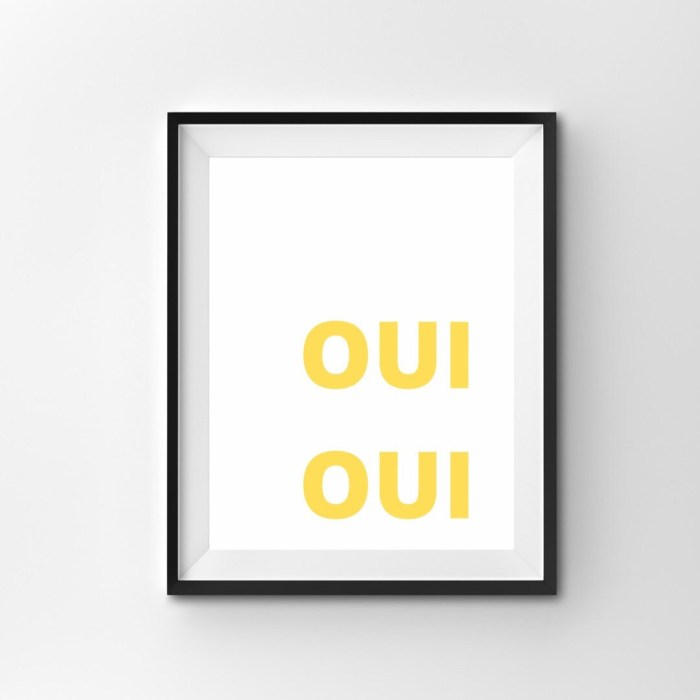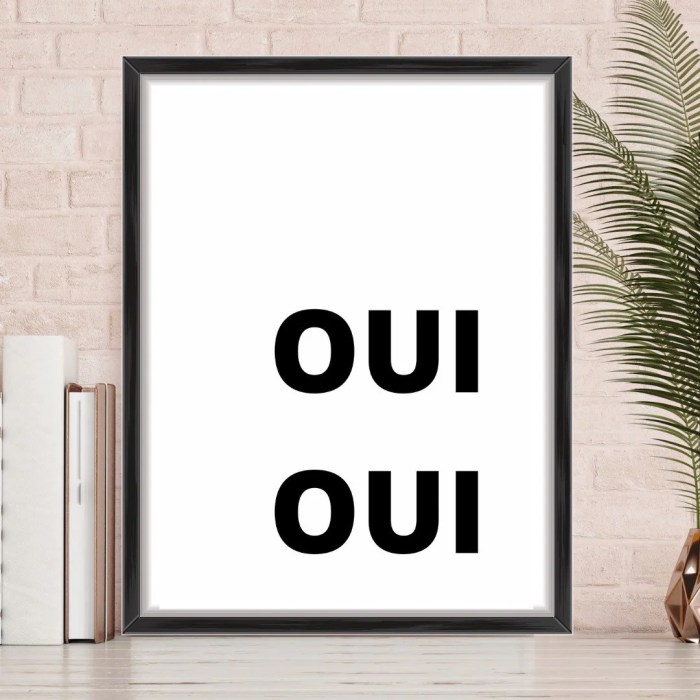Opposite of oui in french – In the tapestry of the French language, “oui” stands as the unequivocal affirmation, the beacon of agreement. But what lies on the opposite side of this linguistic spectrum? Enter “non,” the steadfast negation that weaves its way through conversations, shaping the contours of French discourse.
Delving into the depths of “non,” we uncover its nuances and explore the contexts where it reigns supreme. Prepare to embark on a linguistic journey that will unravel the intricacies of French negation.
Meaning and Usage of “Oui”

In French, “oui” is the affirmative word meaning “yes.” It is commonly used in response to questions or to express agreement. “Oui” can also be used to express consent, willingness, or acceptance.
Formal vs. Informal Usage
In formal settings, “oui” is typically used as a more polite and respectful way to express agreement. In informal settings, “ouais” or “yep” are more common.
The opposite of “oui” in French is “non.” El manto de la veronica is a Spanish phrase that refers to the veil of Saint Veronica, which is said to have borne the image of Christ’s face. In French, the opposite of “oui” is “non.”
Identifying the Opposite of “Oui”

The direct opposite of “oui” in French is “non”, which means “no”. It is used to express negation, disagreement, or refusal.
Examples:
- “Voulez-vous du café ?” “Non, merci.” (Do you want some coffee? No, thank you.)
- “Est-ce que tu es d’accord ?” “Non, je ne suis pas d’accord.” (Do you agree? No, I don’t agree.)
Comparing and Contrasting “Oui” and Its Opposite

The French words “oui” and its opposite convey distinct meanings and connotations. Understanding their differences is crucial for effective communication in French.
Definitions and Usage
| Term | Definition | Usage |
|---|---|---|
| Oui | Yes | Affirmation, agreement |
| Non | No | Negation, disagreement |
Key Differences and Similarities, Opposite of oui in french
- Meaning:“Oui” expresses agreement or affirmation, while “non” expresses negation or disagreement.
- Usage:“Oui” is used in positive responses, while “non” is used in negative responses.
- Connotations:“Oui” generally carries a positive connotation, indicating acceptance or approval. “Non” has a negative connotation, indicating rejection or disapproval.
Implications of Usage
Choosing between “oui” and “non” can have subtle implications. Using “oui” in situations where “non” is more appropriate can convey a sense of over-eagerness or a lack of critical thinking. Conversely, using “non” when “oui” is more suitable can create an impression of rudeness or inflexibility.
Cultural and Contextual Considerations: Opposite Of Oui In French

In French-speaking societies, “oui” holds significant cultural weight. It symbolizes politeness, agreement, and respect for the speaker. The opposite of “oui,” typically “non” or “pas,” carries a more direct and assertive tone. The choice between these terms is influenced by cultural norms, the context of the conversation, and the speaker’s background.
Contextual Variation
The usage of “oui” and its opposite varies depending on the context. In formal settings, “oui” is generally preferred as it conveys a sense of formality and respect. In informal situations, such as among friends or family, “non” or “pas” may be used more frequently to express a more casual and direct response.
Speaker’s Background
The speaker’s background also plays a role in the choice between “oui” and its opposite. In certain French-speaking regions, such as Quebec, “oui” may be used less frequently than in France, with “d’accord” (in agreement) or “c’est vrai” (it’s true) being preferred as more polite and nuanced alternatives.
Cultural Norms
Cultural norms influence the choice between “oui” and its opposite. In some cultures, it is considered impolite to directly disagree with someone, so “oui” may be used even when the speaker does not fully agree. In other cultures, directness is valued, so “non” or “pas” may be used more often.
Essential FAQs
What is the direct opposite of “oui” in French?
The direct opposite of “oui” in French is “non.”
In what contexts is “non” commonly used?
“Non” is commonly used to express negation, disagreement, or refusal in French.
Are there any cultural nuances associated with using “non” in French?
Yes, the use of “non” can vary depending on the context and the speaker’s background. For example, in some formal settings, it may be considered more polite to use a softened form of negation, such as “pas vraiment” (not really).